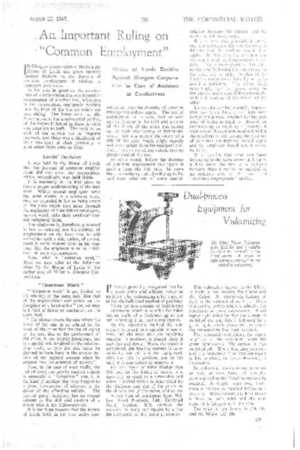_..An_Important Ruling on • "Common Employment"
Page 51

If you've noticed an error in this article please click here to report it so we can fix it.
1-icui,:?. al Lords Decides Against Glasgow Corporation in Case of Accident to Conductress
IN Glasgow Corporation v, Neilson the !House of Lords has given reeently another decision on the doctrine of common employment in relation to transport connpanies.
In the case in question, the conductress of a corporation bus was injured in consequence Of another bus, belonging to the corporation, negligently running into the back of the buson which she was riding. The buseswere on different services, but a substantial portion of the routes followed in those services was common. to.both. The vehicles on each of the' services ran at frequent intervals, and there was a likelihood of their trave_ing in close proximity to each other from time to time.
Lards' Decision
It was held by the House of Lords that the doctrine of common employment did not avan thccorporation, which, accordingly, was held liable.
It is necessary in the first place to have a proper understanding of the doctrine, Where several employees serve the same master in a common work, they are regarded in law as being aware of the risks which they incur through the negligence of their fellow-employees, against which risks their employer cannot safeguard them.
The employee is, therefore, presumed in law as entering into his contract of employment on the basis that he will undertake such a risk, unless,_of course, there is some express term in his contract that the employer is to be liable, even in such circumstances.
Now, what is "common work "? Here we may refer to the definition given by the House of Lords in the earlier case of Miller v. Glasgow Corporation.
"Common Work"
"'Common work is not limited to the sharing of the same task, like that of the engine-driver and stoker on the footplate of a locomotive" (or, we may add, that of driver or conductor, on the same bus).
" The phrase covers the case where the work of the one is so related to the work of the other that the risk of injury to the one, due to the carelessness of the other, is not merely fortuitous, but is a special risk involved in the relationship itself, so that the risk must be deemed to have been in the contemplation of the injured servant when he entered into his contract of service."
Now, in the case of road traffic, the risk of being run into by another vehicle is generally a "fortuitous" one. It is the kind of accident that may happen to anyone, irrespective of whoever is the driver of the offending vehicle. The injured party, therefore; has no special interest in the skill and caution of a driver who is his fellow-servant.
It is for these reasons that the House of Lords held, in the case under con
sideration, that the doctrine of common employment did not apply. •The injured conductress, in its view, had no such special interest in the skill and caution of the driver of the other bus arising out of their relationship as fellow-set'yarns. She was merely the victim of a risk of the road which might equally well have arisen from the negligent conduct of any driver of any vehicle moving closely behind the bus.
In other words, before the doctrine of common employment can apply in Such a case, the risk must be more than the ordinary risk of colliding traffic and must arise out of some special
relation between the injured and the negligent fellow-servants.
If one hears this principle in mind. one can appreciate the reasons %%Iv. in Miller's case, the doctrine was held to apply. In that case she collision was between two cif the Corporation's tram
ears. hey were engaged on the same service and following the same route on the same pair of rails. Neither or the tramcars could move laterally so as to
avoid a collision. The Court held. accordingly, that the injured party on the one car had a special interest—in the skill and caution of the driver of the other.
Let us take another example. Suppose that two buses have dtiven into their company's garage, whether for the purpose Of being garaged, or cleaned, on commencing or finishing a journey; in such a case, if a collision occurred within the precincts of the garage, the doctrine of common employment would apply and th,2 employer would not, it seems. be liable.
it is arguable that when two buses belonging to the Same owner pull up at a fare stage, the risk of a collision between them is not to be regarded as an ordinary risk of the road and "common employment" applies.
















































































